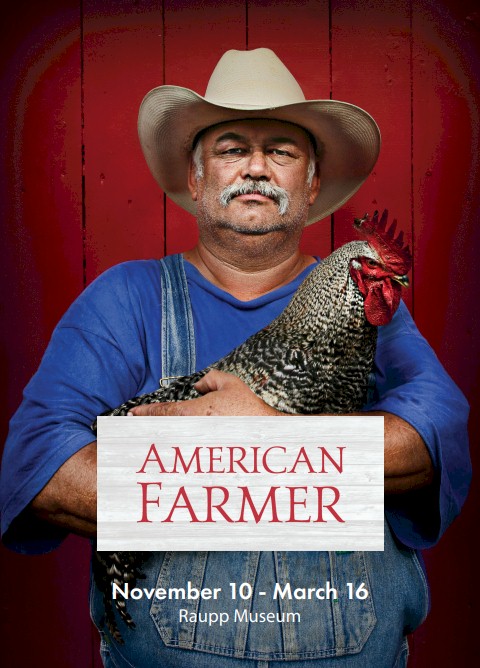Photograph by Paul Mobley
American Farmer celebrates the living spirit of our heartland, through the faces and voices of the people who keep it alive. Featuring 45 full-color and black-and-white portraits and interviews with farmers across the United States—from cattle ranchers to strawberry growers—American Farmer tells the honest and inspiring stories of the true stewards of our land. This is a program of ExhibitsUSA, a national division of Mid-America Arts Alliance and The National Endowment for the Arts.
When photographer Paul Mobley set out to capture the soul of our country’s farm communities, he encountered an enduring rural culture that remains rooted in the principles of tradition, family, integrity, and hard work. Crisscrossing the country, from Alaska to Florida, Mobley and his camera were welcomed time and time again into the homes of hundreds of farm families. Visit after visit, Mobley came to know the independent farmer’s spirit from both behind the lens and across the dinner table. He sought the elusive spirit of agriculture, looking for subjects that mirrored the project’s sense of risk and independence. The resulting images show farmers with a strong sense of where they belong in the universe, a close connection to the land and their day-to-day work as it affects the rest of the world.
Out of a collection of more than 200 of these portraits, ExhibitsUSA has distilled a selection of forty-five iconic portraits showing the geographic and cultural diversity of the American Farmer. This vivid portfolio is accompanied by anecdotes and memories in the farmers’ own words that are both a testament to their enduring hospitality and a moving glimpse into the hardships and joys of a quickly disappearing way of life—one that once defined our national identity and now struggles to remain vital. From Jim Taber, a young single father raising cattle in Montana, to Shirley Schollenberg, the daughter of Alaskan homesteaders, Mobley’s heroic photographs reveal the true face of American farming and remind us what it means to live with simplicity, contentment, and decency in a world that so often forgets.
Paul Mobley is an American photographer who has traveled from remote Alaskan villages to the majestic palaces of Croatia to find the face of a thousand words. Mobley’s first book, American Farmer: Portraits from the Heartland, was first published in the fall of 2008 by Welcome Books and received the 2009 Western Heritage Award for Best Photography Book from the National Cowboy and Western Heritage Museum.
Raupp Museum Curator Debbie Fandrei will offer information beyond the exhibit label.
This exhibit closes March 16, 2024. If you wish to go on your own, their hours of operation are Sunday: 1-4 pm, Monday – Thursday: 11 am – 4:30 pm, Closed: Friday and Saturday.
You can use this opportunity to visit Raupp’s permanent exhibits:
Main Gallery tells the story of the history of Buffalo Grove, beginning with Potawatomi life in the 1830s, continuing through early farm settlement, and arriving at the bustling suburb of today. Visitors to this exhibit can look at a Potawatomi garden, sit on the porch of an 1890s house, milk a replica dairy cow and much more.
Crossroads Gallery explores life in Buffalo Grove during the early 1900s. Visitors can listen to a telegraph at the Train Station, try shopping at the General Store, and learn what it was like to grow flowers at the Greenhouse.
***
Sunday, February 18, 2024, 1 PM arrival
Raupp Museum
901 Dunham Lane, Buffalo Grove, Illinois
Directions
There are 12 parking spots in the upper parking lot, and then it is totally permitted to park on the museum side of the street. Museum’s streetside doors will be unlocked, so people won’t even have to climb up the hill.
If you are likely to use public transportation to reach the Raupp Museum, let us know if you need assistance. This museum is located in a residential neighborhood.
Strictly Optional:
If you wish to come early for lunch, then let’s meet at Mitsuwa’s food court at 11 AM. Mitsuwa Market, at the intersection of Arlington Heights and Algonquin Roads in Arlington Heights, is like walking into Japan. It’s a grocery store, food court, bakery, bookstore, and small appliances catering to Japanese tastes under one roof. Show up or let us know to look for you. If you have any questions, please e-mail: Culinary.Historians@gmail.com

